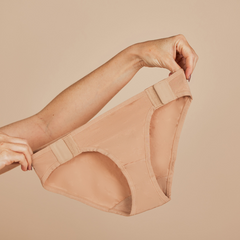
This post was written by our Resident Sexual Health Clinician, Dr. Kathryn Ellis, OTR/L, OTD, AASECT-SC, an occupational therapist and American Association of Sexuality Educators, Counselors, and Therapists Certified Sexuality Counselor. If you'd like her to answer your questions, submit them at the end of this page.
Energy expenditure for sexual activity can range from zero physical exertion to high physical exertion. For people with limited energy or chronic pain, it can be very frustrating to feel like you can't keep up with the physical demands of sex.
This can in turn lead people to avoid sex or stop having sex all together because they are anxious over exerting themselves or having an energy depletion after the sex.
Energy conservation techniques are very helpful to modifying typical sexual routines and making sex comfortable again. Below are a few strategies that can help you continue to enjoy sex while navigating low energy level or heart rate parameters.
Slow isn’t boring, for many people it’s better.
Oftentimes people equate a passionate or intense lovemaking session with activity that requires a high energy expenditure. On the contrary, a slow and gentle touch can provide teasing, titillating, and exciting sensations.
Try out sexual touching that is slow and intentional. Tease specific erogenous zones, such as the inner elbow, nipples and earlobes, by touching close to those areas and then backing off, moving slowly and eventually stimulating the areas.
Know what your comfort threshold is for exertion.
Knowing what your unique comfort zone is can give you the confidence to be sexual. Stay in tune with when you’re starting to feel your breathing go from easy breathing to a little heavy breathing and then start to back off in exertion. If you start to feel nervous when you start with heavy breathing, back off and try to maintain an easy breathing throughout.
Choose activities that are less strenuous.
As we mentioned above, not all sexual activities require a ton of energy. Fingering, sex toy play, oral sex are all typically less strenuous than penetrative sex.
Talk to your partner about a variety of sexual things you can do and work to expand a “sexual menu” that includes these activities. Also, adapting and modifying activities can help you continue to engage in activities you find fun and pleasurable.
A good example of this is giving oral sex while laying down with your head on a pillow instead of kneeling or on all fours. Another suggestion is to consider how a sex toy can add increased stimulation while decreasing the effort on your end.
Spoon Theory & Sex
Spoon Theory was developed and embraced by folks with chronic illness to explain the amount of physical and mental energy a person has available in a given day. The idea is that you only have a given number of spoons (energy) for the day and when you’re out of spoons, you're out of energy for the day.
Knowing there is a set number of spoons, people can plan ahead in their day and divvy up a number of spoons for each activity including sex. Planning for sex is a great idea for many reasons, one of them being knowing to conserve your energy for it or plan it for a time in the day when you have the most amount of energy, for example the morning versus at the end of the day.



